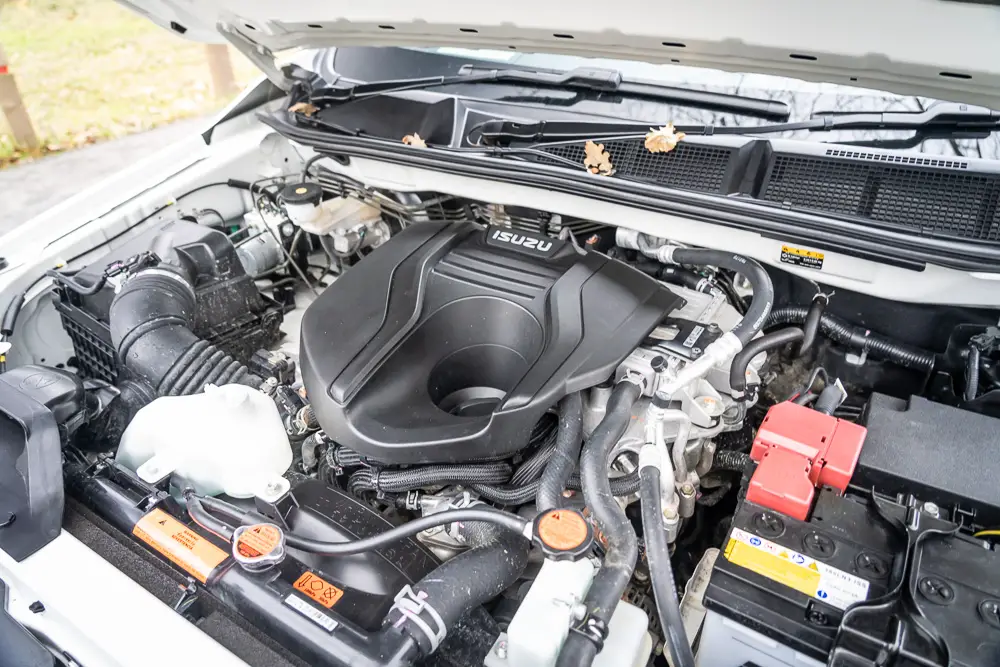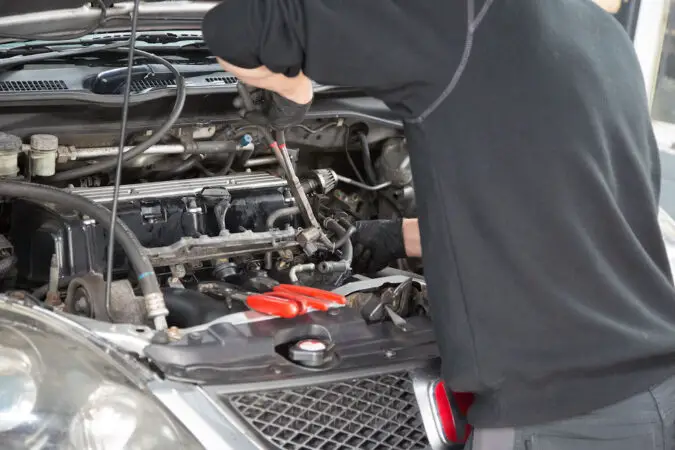Have you noticed some weird ticking noises that come from your engine and you think that you have an engine ticking problem? Well, if that is the case, then you are at the right place because there will be a lot to cover on this topic.
Having a problem with engine tick can be really annoying to deal with. Why is this so? Well, this is the case because this indicates a problem inside of the engine. This problem might seem simple. But once you start disassembling things you might be surprised by the sight that you will get.
This is why you need to address this problem as soon as possible in order to avoid further damage to be done to the engine. You just don’t need to put these things under the rug and ignore them just as if they don’t exist. This is a bad practice and this practice will possibly cause your engine to completely fail and you end up paying thousands on repairs. But you shouldn’t worry because we are going to help you out.
First, we are going to learn what is engine ticking and how serious of a problem this is. Then we are going to cover the situations when this problem occurs as well as the causes for this issue. After that, we will dive into diagnosing and the cost to diagnose and fix this issue. So, if you want to learn more about this problem and how to solve it, follow along.
What Is Engine Ticking?
Now before we dive into more complex topics and understand the causes for this problem with engine ticking. Let’s cover some of the basics of this problem and learn what it is and what it represents.
Knowing this will be extra useful for beginners who are not into cars and want to learn the basic stuff first before they jump into more complex topics like the causes for this problem and why it appears in the first place. So, let’s get into it.
As you probably know, engine ticking is audible information that you have a problem with inside of the engine. This is a symptom that will notify you that some of the components inside the engine are not performing as they should perform.
What is good is that this symptom is easily identifiable for the trained ear. If you have experience solving problems like this, you will be able to tell what is causing the issue in your engine.
What is most important is that you should not confuse this problem with rod knock. Rod knock is a completely different thing that is really serious.
And when this problem appears, there are no ticking noises but a constant knock. This constant knock is there because the bearings are worn out and the rod basically hits the crankshaft. When you have this problem, you should know that your engine is near the end of its lifetime. But when it comes to engine ticking, not so much.
But how serious is this problem with the ticking? Well, that’s what we are going to elaborate on in the following chapter where we are going to learn about the level of concern for this problem.
Is This Problems Serious?
When it comes to engine ticking, we need to discuss the seriousness of this problem. Is this problem as serious as some people would think or possibly not?
Well, we can tell you that this is not that serious problem. Which means that it will not immediately ruin your engine.
But the situation is concerning. Mainly because this ticking will affect other components of the vehicle and this ticking will be really difficult to deal with on a day-to-day basis.
Imagine that you need to hear this ticking all the time during your drive and commute. It could be frustrating to drive.
Not to mention the long-term effects of the ticking on the engine and its longevity. The engine will suffer some serious internal damage if its ran like this in the long run.
This is why you need to try to learn why this problem is and what is causing it. And then how to fix it. Luckily for you, we are going to elaborate on the causes later on in the article. But first, let’s learn more about the situations when this problem appears in the first place. So, you don’t want to miss that.
Situations When The Engine Ticking Appears
Now before we dive into the causes of engine ticking. Let’s first learn more about the situations when this problem might occur in the first place. And knowing these situations will help you determine if you have a problem or not and how serious is this problem. So, let’s cover them briefly.
The first situations that we are going to cover are the ticking noise in engine when starting and the ticking noise in engine while idling. These two situations are most often caused by a problem with the spark plugs or ignition coils.
Whenever you experience misfires like in this case, you will get that ticking sound. But what are misfires in the first place? Well, a misfire is a situation when you have a premature or delayed combustion occurring in the combustion chamber.
And this problem is most often caused by bad ignition coils (which you can diagnose by learning how to test a coil), spark plugs, and bad wires or distributors if you have an older vehicle that is still running the good old distributor ignition.
These older motors are notorious for developing a misfire since their ignition is not as perfectly timed as in modern internal combustion engines where everything is computerized.
The next situation is when you have a ticking noise in engine when starts then stops. This is a common problem with engines that have too many miles under their belt and do not perform well. This is the case, in most cases because of oil sludge inside of the engine.
The oil simply struggles until it reaches the top of the engine, causing a tick at the start. But after it reaches the rockers it smoothens up and disappears. But what are the causes for this engine ticking problem? Let’s elaborate more about them next.
Causes For Engine Ticking
Now let’s dive into the causes of engine ticking. As we noted, every problem has a cause. This is why in the following chapters we will go through the most common causes for engine ticking to develop.
Knowing the causes will help you out when it comes to the diagnostics process and you will be prepared and have the right knowledge when it comes to diagnosing this issue. So, if you want to learn more about how you can tackle this problem, keep up with us.
1. Low Oil Pressure
The first and most common cause of the engine ticking problem is the low oil pressure. The oil pressure is key when it comes to the proper work of the engine.
Oil pressure simply helps your engine work better and be up to the task all the time. When it comes to low oil pressure. We can tell you right away that the oil doesn’t face any obstacles when it comes to flow.
This means that the internals of the engine are probably worn out and your engine couldn’t build up enough of this oil pressure so the engine works well and causes the ticking noise in the process.
When it comes to this symptom, it is useful to check the oil pressure gauge and see what kind of pressure you are getting. If the pressure is below 25 psi, then you definitely have low oil pressure and this problem needs sorting out as soon as possible. Now let’s move on to the next probable cause for the engine ticking problem.
2. Low Engine Oil
Another really common cause for engine ticking, especially ticking noise when accelerating is the low oil level.
If you drive a car that is running low on oil, then you will probably face this problem. The car will increase the ticking noises when the car accelerates. So, why is this the case?
Well, this is the case because there is not enough oil. This means that the oil doesn’t flow to the top of the engine. Causing the engine to start ticking since it is not lubricated.
3. Weak Oil Pump Or Sludge
The next cause for engine ticking is the situation when you have a weak oil pump or sludge development inside of the engine.
A weak oil pump will struggle to push the engine oil through the engine. This means that not enough oil will be there to lubricate the top of the engine.
Causing the rockers and lifters to be bone dry and produce noises in the process. Also, sludge development is a really serious issue that could cause a problem like this.
The sludge basically sticks in the oil passageways and prevents the engine oil to pass through. Since there is no oil to pass through let’s say to the top of the engine and lubricate these components, it will cause them to friction and produce these types of noises.
So, checking the condition of the oil and removing the valve covers to see if there is sludge inside of the engine should be your top priority. Just remove the valve cover and see how the engine oil is flowing. If the top of the engine is not lubricated, you are probably having a problem with sludge or a weak oil pump. Now let’s move to the next probable cause.
4. Lifter Ticking
Now let’s cover another cause for the engine ticking and that is the lifter tick. Lifters are we all know are the components that sit between the pushrod and the camshaft.
When it comes to this type of ticking, we can say that it often happens on higher mileage pushrod engines. Especially the HEMI engines by Chrysler. Namely, the 5.7 liter V8.
This tick is most often caused by bad lifters, oil sludge, or bent push rods. This sound is mainly caused because of a weak contact between the lifter and the pushrod or camshaft.
So, if the ticking noise comes from the lifter valley, you should definitely check these lifters and see if they are in good condition or need replacement. What is good though is that they are easy to replace. Even though it is time-consuming, the process is really straightforward.
In the process, you will also be able to check the rods and see if there are any bent rods on your engine that could cause the engine to tick.
5. Maladjusted Rocker Arms Or Valves
The next very common cause for the engine ticking noise when cold is the problem with the maladjusted rockers and valves.
And frankly, this is one of the most common causes of the ticking noise to develop. So, why is this the case?
Well, this is the case because the valves and rockers were tightened at the factory up to the right spec. And you have driven the car for 100,000 miles. During this long period, you can expect that these components will loosen up and cause problems. Like in our case.
The engine will start to tick and you will need to fix this problem as soon as possible if you want to get rid of this annoying noise.
Some engines have even recommended valve job intervals that you need to follow so you avoid some of these situations. But unfortunately, not a ton of engines have this type of service intervals and you need to rely most on your ears to determine what could be causing these ticking noises to develop. Now let’s move to the next causes.
6. Exhaust Leak
Now let’s cover some of the causes that are not related to the engine oil and the mechanical components of the engine.
The first of these causes is the exhaust leak. As you probably know, exhaust can leak. Especially on the manifolds.
The manifold bolts tend to break and cause leaks to develop. When this happens, there will be ticking or hissing noises that will be present. In most cases, there are hissing noises but in some instances, ticking noises can also be the case when you have a problem like in our case.
So, make sure that there are no dark spots around the exhaust manifold. If there are, then probably some of the bolts of the manifold have cracked and need to be replaced.
7. Worn Out Spark Plugs
The next cause that we are going to cover that can frequently cause engine ticking is bad spark plugs.
Whenever spark plugs fail, they can cause the engine to misfire. And as we all know, misfires resemble ticking noises coming from the top of the engine. So, checking the spark plugs should be one of your top priorities when it comes to dealing with issues like this on your car.
You need to learn how to read spark plugs and be able to determine if they are fouled or not. These spark plugs can go bad from many different causes. Oil burning, running rich or lean, blown head gasket. All these situations can cause the engine to develop ticking noises. Now let’s move to the next cause before we learn how to diagnose stuff.
8. Bad Ignition Coils
The last cause for engine ticking that we are going to cover is the problem with the ignition coils. Whenever you experience a situation like this you should check these components as well. So, why is this the case?
Well, this is the case because these components are basically delivering the current to the spark plugs. They are small electric transformers that generate high currents.
Whenever they malfunction, the spark plugs will start to misfire or not work at all. But luckily for you, these components can be checked with an OBD2 scanner. And in the following chapter, we are going to explain how you can diagnose this ticking issue on your car. And you don’t want to miss that.
How To Diagnose & Fix The Ticking Noise
Now let’s get to business and learn how to diagnose engine ticking. What is the simplest method? Well, the first thing you need to do is to diagnose whether the car is misfiring or if this sound comes from the engine internals.
In order to diagnose a misfire, you will notice how the engine has a rough idle and will shake a lot. Also, there will be ticks coming from a specific cylinder, and also pops from the exhaust. When this is the case, you can tell that your engine is misfiring.
Another thing you can do in this case is to diagnose the problem with an OBD2 scanner. Just scan the car and if there are misfires, you will be able to tell right away from where these misfires are coming and whether the spark plugs or coils are bad.
On the other hand, if you have ticking noises and the ignition seems okay. Then you would like to perform a check of the oil and the oil flow. Check if the oil level is good first.
Then remove the oil cover and see if there is good flow coming from the rockers while the engine is running. If there is good oil flow, then it means that you have good lubrication.
The last thing to check is the lifters and push rods. And these components can only be diagnosed by doing a proper dismantling of the engine.
Cost To Fix The Ticking Noise
So, what is the cost to fix this problem with the engine ticking? Well, the cost really varies from case to case.
For example, if this is caused by a bad spark plug, you can easily get away with $50 to $120 to replace the spark plugs on your car. Or a coil which can cost you about $150.
But if the problem is much deeper, and there are bad lifters or bent push rods. Then you can expect that the repair bill will be somewhere in the range of $600 and $1,200.
Also, valve adjustment is cheap and will not cost you more than $350 to adjust the valves and replace the valve cover gasket.
Conclusion
In this article, we have covered quite a bit when it comes to the problem with the engine ticking. First, we learned what this problem represents and the situations in that you will notice this issue.
After, we elaborated more on the causes of this problem and how you can diagnose the issue and locate where this sound is coming from.
F.A.Q
Now let’s answer some frequently asked questions.
What Causes Engine Ticking
Engine tick is most often caused by bad lifters. These lifters are components that sit on top of the camshaft and move up and down based on the camshaft input. Then they transfer this force through the push rods to the rockers. Thus, making the valves open and close. Another cause for ticking can be engine misfires as well.
Why Is My Engine Ticking
In most cases, this is caused by bad lifters on your car or truck. Or possibly bent push rods. Another common cause can be misfires caused by bad spark plugs or bad ignition coils on the engine.
What Does Ticking In The Engine Mean
Ticking is audible information that you have a problem with your engine. But this problem is not that serious after all. It could be caused by a lack of lubrication, engine misfires, or bad lifters.
What Is A Lifter Tick
A lifter tick is created when the pushrod gets bent and there is space created between the lifter and the push rod. When this happens, the engine starts to tick and noises will be present. Also, the lifters can fail and cause this problem as well.
How To Get Rid Of Lifter Tick
Getting rid of the lifter tick is only possible by replacing the lifters and the push rods in most cases. This is a straightforward job that is fairly easy to do on a car. But you still have to know how to adjust the valves when you are done.
How To Fix Ticking Noise In Engine
Fixing the ticking noise is possible by addressing the root cause of this problem. And that are the lifters of the engine. You need to inspect them and replace them if necessary to solve this problem with your car.






